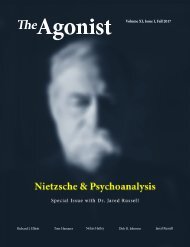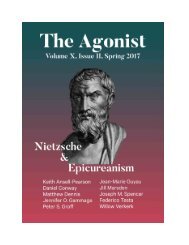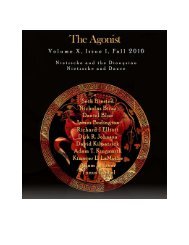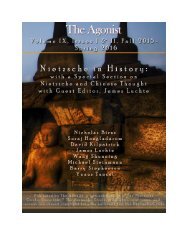Volume XII, Issue II, Spring 2019
You also want an ePaper? Increase the reach of your titles
YUMPU automatically turns print PDFs into web optimized ePapers that Google loves.
THE AGONIST<br />
which then implies that organic beings are nothing but an ever-changing realm of<br />
individual beings (181). In other words, Darwin’s account of evolution also allows<br />
for a radically temporal conception of the organic world (182). The difference<br />
between this interpretation of Darwin and Nietzsche’s own polemic can then<br />
perhaps be explained by a certain misunderstanding of natural selection as a<br />
mechanical, purely utilitarian process. As Stegmaier has it, Nietzsche did not<br />
realize that it constitutes an open and indeterminate development.<br />
Stegmaier’s contributions to Nietzsche’s ethics seem less pertinent than his<br />
reflections on the impact of time on philosophical thought. He defines ethics as<br />
freedom from particular moralities (388). Morality, for Stegmaier, provides<br />
orientation through specific norms, while ethics requires us to renounce the<br />
reliance on any leading norm. This way, the distinction between master and slave<br />
morality made by Nietzsche is interpreted without his violent anti-egalitarianism,<br />
as expressing a rather tolerant and pluralistic attitude toward the variety of<br />
possible moralities. In his own ethics, Nietzsche avoids the attribution of guilt to<br />
others (412) and recommends nobility as an attitude of generosity and hospitality<br />
(413). Nietzsche also allows for a distinction between power and violence,<br />
Stegmaier points out (416, footnote).<br />
Highlighting the elements of moral pluralism in Nietzsche is no doubt<br />
important. One can, however, suspect this pluralistic interpretation of being too<br />
harmonious at the end. It seems to neglect the more dramatic truth-finding that<br />
Nietzsche describes, among others, as a process of illness and healing. For<br />
example, the nobility of the “sovereign individual” is one that is found in solitude<br />
alone, far from the consideration of the validity of the opinions of others, and<br />
with the constant risk of losing it again. Pluralism, in other words, is based less<br />
on the coexistence than on the antagonism of value systems in Nietzsche, and<br />
this aspect seems to be undervalued in Stegmaier’s work. A similar conclusion can<br />
be drawn from his emphasis on orientation as a means to deal with the openness<br />
of modern society: “Orientation nowhere has something firm to hold on to, it<br />
doesn’t know anything firm, but it also doesn’t need anything to hold on to. Quite<br />
to the contrary, it functions based on reference points, which lead to further<br />
reference points. Orientation turns everything into signs that refer to other signs”<br />
(175). The philosophy of orientation, at the end, seems to take the painful<br />
contradictions out of modern life, which is as much characterized by one’s being<br />
without any orientation than by the ability to find a reliable one. Often times, the<br />
“reference points” that are found are but traces of what has been lost. 4 This<br />
means that if we use Nietzsche in order to cope with nihilism, as Stegmaier<br />
4 A similar point is made in Johnson’s review, see above.<br />
68









